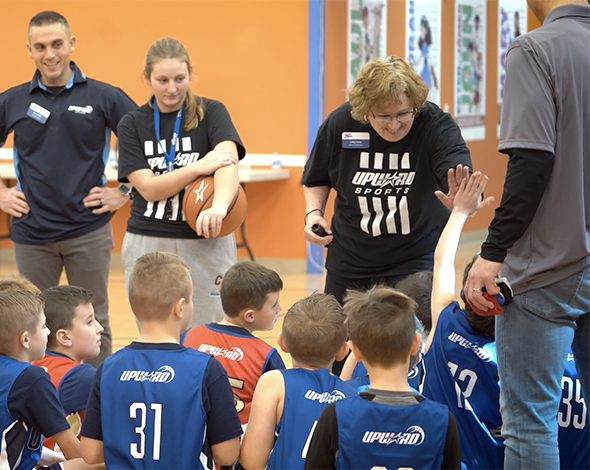
How to Coach Youth Sports
Laura Coulter | Content Writer at Upward Sports
In many youth sports leagues, coaches are often parents or other volunteers who have little to no coaching experience. When you’ve never coached a team before, it can be a little intimidating. But the truth is, you don’t have to be an expert in the sport or have years of experience to be a great coach. There are a few keys to being a great youth sports coach that will help set you up for success.
1. Be prepared and organized.
From day one, decide you will be committed to your role as a coach. Study any areas of the game you aren’t as familiar with. Search for videos of age-appropriate drills and activities that you can use to help teach your players the skills and strategy of the sport. Make a plan for each practice, knowing what you want to work on and how you will spend the practice time. Observe your team during games to determine what you need to work on in the next practice. Before each game, know what positions each athlete will play and any specific guidance you want to give to the team or certain players. It’s better to over-prepare than to feel lost on the court or field.
Think ahead. Ensure you have all the necessary supplies for drills and games (balls, cones, pinnies, etc.). Have an extra water bottle on hand in case someone forgets theirs. If you want to have snacks at games, enlist a parent to organize a snack schedule or send out an online sign-up sheet. Games and practices will not always go smoothly, but you can eliminate stress and make it a better experience for everyone simply by planning ahead.
2. Be a good communicator.
Don’t just tell an athlete to do something; explain the reasoning behind it. If you are teaching younger players new to the sport, be sure to explain the rules and break down the skills you teach in a way they can understand. Physically demonstrate a skill or a drill whenever possible. It’s also important to be clear with your team about expectations for practices and games (be on time, shake hands after the game, stop playing when the ref blows the whistle, etc.).
Communicating with parents is essential. Set up a way to communicate from the very beginning of the season so that you can always get in touch with them about schedule changes and other important announcements. Whether it’s a group text or email, it will make a huge difference to be able to communicate with parents in an efficient way. Keep them updated throughout the season and send out reminders about games and practices.

3. Be a positive role model.
You will influence the players on your team more than you know. If you want them to have a positive experience, you must lead by example. Demonstrate good sportsmanship at all times. Be honest and promote fair gameplay. Watch how you speak to your team. Be sure to encourage players and build up their confidence rather than yelling at them or tearing them down. Speak more about what they can do to improve rather than emphasizing everything they’re doing wrong. Focus on teamwork. Not every child who plays youth sports will continue to play as they get older, but all children will benefit from learning how to work well with others.
One way to be a positive role model during games is to use the Circle of Affirmation (developed by Upward Sports). When the referee makes a call, react in a positive way. The parents should follow your lead as the coach, and the players will respond to the parents’ positive reaction, which creates respect for the authority of the referee. This leads to a fairer and more positive game experience for everyone involved.
4. Make it fun.
Think about all the benefits children get from playing sports. It keeps them active and healthy. It gives them an opportunity to make friends and grow their social skills. It teaches them how to communicate and handle conflict. The list goes on. It’s a great thing that the players on your team are there. As a coach, you can help ensure they’re having a great time and will want to continue playing sports.
A positive attitude goes a long way in keeping everyone having a good time. But you can also look for ways to make practices more engaging by playing fun games to develop skills. And you can come up with creative ways to build team camaraderie, like a kids versus parents scrimmage or a celebratory ice cream party after a big win. Kids probably won’t remember everything you taught them about the sport, but they will remember how it felt to be part of a great team.
Let’s be honest. For a volunteer coach, this is a lot of work! Thankfully, organizations like Upward Sports can provide leagues with the resources to make these things much more manageable. Upward Sports equips churches with the tools for reaching their communities through sports ministry, serving hundreds of thousands of participants annually through their leagues and camps, with the mission to promote the discovery of Jesus through sports.
Upward provides easy, on-the-go access to practice plans, skills and drills, and substitution rotations that make running a practice and coaching a game a breeze. Upward also makes it easy to communicate with parents and offers Bible-based devotions to allow coaches to invest in the spiritual growth of the players on their team.
If you’re a church leader interested in starting a youth sports league for the kids in your community, visit www.upward.org/church-leaders
If you’re interested in coaching in an Upward league or getting your child involved in youth sports, you can find a league near you at play.upward.org.
Share
Other blogs that may be of interest to you:


